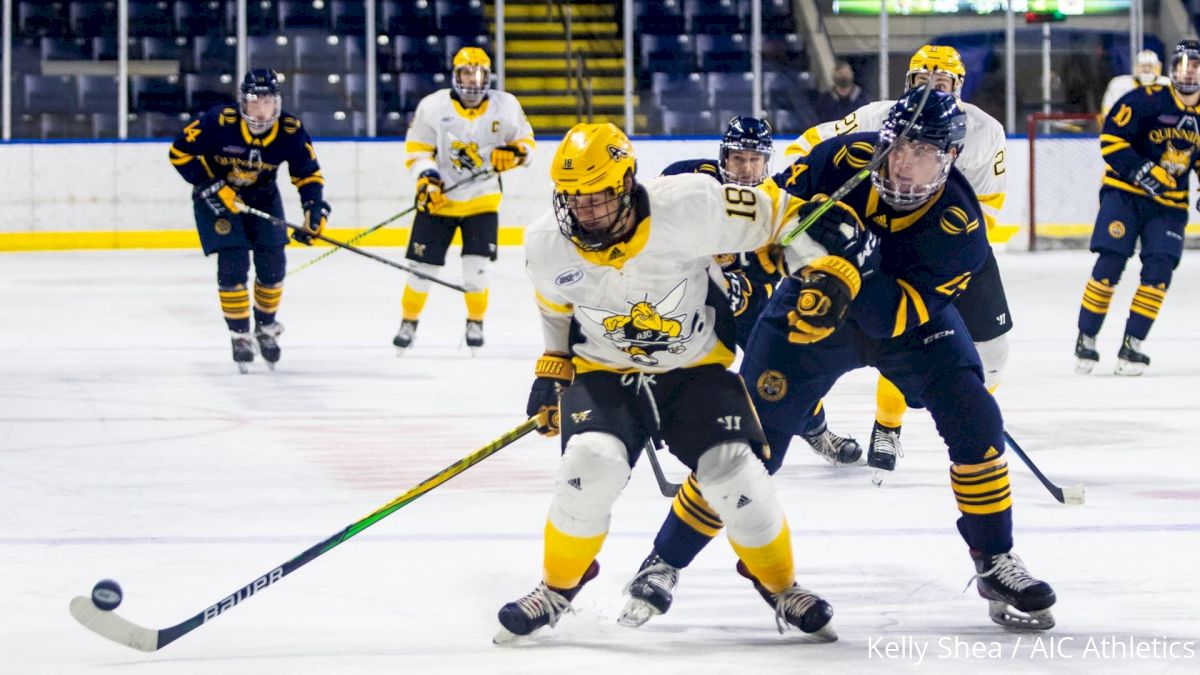2020 Atlantic Hockey Wrap: Where The Conference Stands After One Semester
2020 Atlantic Hockey Wrap: Where The Conference Stands After One Semester
Checking in with Atlantic Hockey at the semester break: AIC still rules, offensive struggles, defensive success, and pandemic scheduling.

With conference play wrapped up in Atlantic Hockey for the calendar year, some programs are appearing to adapt to the pandemic-related changes better than others as the New Year approaches.
Atlantic Hockey split its teams into two “pods” to help limit travel and stave the possibility of contamination and spread of COVID-19. In the Western pod is Canisius, Mercyhurst, Niagara, RIT, and Robert Morris. In the Eastern pod is AIC, Army, Bentley, Holy Cross, and Sacred Heart. Air Force is skating as a floater between the pods.
Additionally, new Division I independent program Long Island University partnered with Atlantic Hockey for its inaugural season and is also playing as a floater between the pods. All 11 Atlantic Hockey teams will rejoin and be seeded 1-11 for the annual conference tournament. The winner will earn an automatic bid to the 2021 National Tournament.
AIC Remains The Heavyweight
The No. 19-ranked Yellow Jackets have claimed the regular season title in each of the past two seasons and were the heavy favorite for the 2020 conference tournament title, which they also won in 2019.
The Jackets remain the powerhouse of Atlantic Hockey, sitting 5-0 in conference play and 5-2 overall, after losing a pair of games to No. 16 Quinnipiac over the weekend.
Prior to the Quinnipiac series, AIC’s stalwart defense had allowed an average of just one goal per game. The back line has carried the Jackets to a six-point lead in Atlantic Hockey. With Robert Morris and RIT as the next-closest teams and both playing in the opposite conference, head-to-head battles for points won’t exist this season.
The Jackets are also packed with a deep offense with 10 different goal-scorers through the team’s first seven games. AIC leads the conference in goals-for and goals-against, giving them a full-ice advantage over their conference rivals.
Offensive Struggles
Air Force holds a 0-4 overall record, stemming from a weak offense that has managed just five goals in four games, placing them second from the bottom of the NCAA in goals per game.
A pair of exhibition games with the USA U-18 program saw a tad more offensive flash, which could be a spark when conference play picks back up in January. The Falcons will start the new year against an equally struggling Niagara team sitting just one spot up in the conference standings.
With the same number of goals, albeit in one fewer game, Army has also seen a less-than-ideal start to their season. But while the offense may not be quite where the coaches would prefer it, the defense is picking up the slack.
Allowing just eight goals over three games, the Knights are 17th in the NCAA in goals against per game (2.67 g/gm). Maintaining that defensive proficiency will go a long way in soothing the offensive struggles until the team can find some more scoring.
The loss of Jason Cotton, Mike Lee, Austin McIlmurray, and Vito Bavaro has shown to be too a significant hurdle for Sacred Heart early in 2020-21. The four combined for 59 of the team’s 132 goals last season, equating to 45 percent of the offense in 2019-20.
After a historic season for the program, the Pioneers have struggled to make up for the offensive losses with just eight goals in four games, going 1-3. There is a lot of work to do to recreate the magic of 2019-20, but opening the new year against Army could go a long way in recovery.
An Unbalanced Schedule
The ongoing navigation of the newly formatted season has seen some complications, resulting in a highly unbalanced schedule in Atlantic Hockey. During the shortened fall semester, the conference’s programs played a range of 2-6 games.
Sixteen conference games have been postponed, in addition to four being canceled. But come March’s tournament, each program is scheduled to have played 22 total conference games — assuming all postponements are fulfilled with no more scheduling problems.
That imbalance of the fall semester will weigh heavier in the new year. Where Niagara has the low of just 14 conference games from January-March, Army has 19 remaining on its schedule.
That much, or little, hockey affects programs independently. Scattered play could create a hiccup in routine for those with fewer games remaining. Reversely, others may find a lag in shortened downtime between games, or even find a stride with more consistent play.
Have a question or a comment for Jacob Messing? You can find him on Twitter @Jacob_Messing.